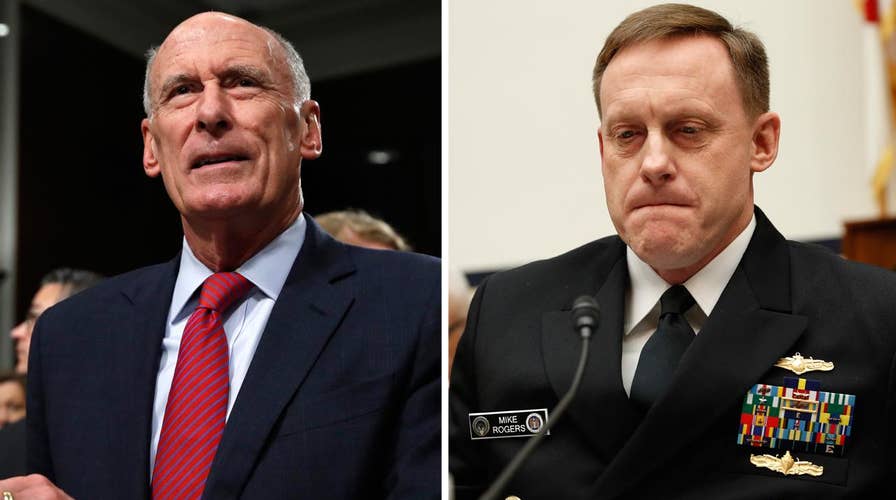Report: Trump asked intel chiefs to deny claims of collusion
Director of National Intelligence refuses to confirm or deny report; reaction from A.B. Stoddard, associate editor and columnist at RealClearPolitics
The nation’s top intelligence official testified Tuesday that government leaks are hurting national security, while remaining mum on the latest leak-driven report – that President Trump asked him and another top official to swat down claims of collusion between his 2016 campaign and Russia.
The Washington Post reported Monday that Trump looked to Director of National Intelligence Dan Coats and National Security Agency Director Adm. Michael Rogers to push back against the FBI’s Russia probe after former FBI Director James Comey’s March 20 testimony in which he told lawmakers the bureau was investigating the “nature of any links.”
In a Senate Armed Services Committee hearing on Tuesday, committee Chairman John McCain, R-Ariz., asked Coats whether the Post’s latest story was “accurate reporting,” to which Coats declined to comment directly.
“As the president’s principal intelligence adviser, I am fortunate to spend significant time with the president to discuss national security interest and intelligence,” Coats said. “I have always believed given the nature of my position and information in which we share, it is not appropriate for me to comment publicly on any of that, and on this topic, I don’t feel it’s appropriate to characterize conversations with the president.”
CLINTON DEPUTY PODESTA BLAMES RUSSIA, FAKE NEWS FOR 2016 LOSS
But Coats underscored the significance of leaks and their potential to damage national security.
“The release of information not only undermines the confidence in our allies, but our ability to maintain secure information we share with them, and they jeopardize sources and methods that are invaluable in finding out what’s going on and what threats are,” Coats said.
“Lives are at stake and leaks jeopardize those lives,” Coats told the committee.
Ranking Member Sen. Jack Reed, D-R.I., presented Coats with a hypothetical, asking whether it would be appropriate if a president reached out to the NSA or the ODNI to make the kind of request described in the latest report.
“I made it clear in my confirmation hearing for the Senate Select Committee on Intelligence that my role of DNI is to provide information and intelligence information relevant to policy makers so that they could base their judgments on that,” Coats answered. “Any political shaping would not be appropriate—I have made my position clear on that to this administration and I intend to maintain that position.”
Coats told lawmakers that if a memo existed proving the facts of the Washington Post report, which Coats said did not exist, he would make them available, along with any other relevant details to Special Counsel Robert Mueller.
Coats also told lawmakers that he was not aware of any requests made by the Trump administration, written or verbal, ordering officials in the ODNI to ignore requests from congressional oversight inquiries.
Coats, though, said the ODNI was looking at “every opportunity to hold Russia accountable,” and said there was “clearly a consensus” that Russia meddled in U.S. election process, as well as elections in other western countries.
But Sen. Richard Blumenthal, D-Conn., pressed Coats on whether he had any conversations with Rogers regarding The Washington Post’s allegations, to which Coats took an extended pause, and said that was something he would like to “withhold.”
Blumenthal slammed Coats and said based on his response, he assumed the “implicit answer is yes,” and requested the information about the substance of a possible conversation in another setting.
The hearing was initially scheduled to focus on “worldwide threats,” which lawmakers and witnesses discussed, condemning the attacks in Manchester on Monday night that killed 22 and injured more than 50. The Islamic State claimed responsibility of the attack, but U.S. officials have not yet verified this claim.
Coats told lawmakers that he recently returned from London, where he spent a “significant amount of time” discussing threats to the homeland.
“It happens all too much,” Coats said. “It reminds us this threat is real—it is not going away, and it needs significant attention.”
Coats outlined the main threats facing the U.S. homeland, focusing on cyber threats, ISIS, Russia, Syria’s ability to use chemical weapons, and the growing threat North Korea poses to the U.S.
Coats told lawmakers that his "initial message" to the intelligence committee is "do your job."
Coats added: "Provide us the best intelligence of any entity in the world and keep your focus on what we're here to do--I'm confident, that's what we're here to do."
Fox News' Lucas Tomlinson contributed to this report.













































